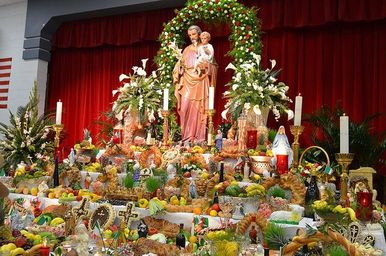|
This Lent, my 2nd grade class is in charge of encouraging our school to donate to CRS Rice Bowl, a program which helps raise money for those who are less fortunate in 6 places around the world. Our school’s efforts help students raise awareness of hunger and poverty. My class has been determined to give all they can in the past for service projects, but what sets this project apart? That is the question I have asked my students to ponder. One girl told me that her snack after school is Doritos, so for each day she doesn’t snack on this favorite treat, a quarter will be added to her jar for someone “hungrier than me.” Another boy told he scours his house and cars for loose change, and drops it in the Rice Bowl whenever he finds anything, even a penny. He asked me, “Every bit counts, right Ms. Kirby?” Indeed it does.
As Pope Francis reminded us at the beginning of the Lenten Season, our fast must be a fast from indifference toward others. The time has come for us to use these remaining 40 days to contemplate our actions toward others, striving for the utmost respect and care for them. Instead of searching for ways to improve our own lives, maybe it is time that we turned to the poor and vulnerable and improve theirs. Francis writes, “Indifference to our neighbor and to God also represents a real temptation for us Christians. Each year during Lent we need to hear once more the voice of the prophets who cry out and trouble our conscience.” It is not sacrifice to give of our excess or to simply change our diets during Lent, our Holy Father is calling us to fast from our indifference and turn to love. In this New Evangelization, there are tangible and realistic ways for each and every one of us to change hearts. This change must start within our own broken and sinful hearts and through God’s mercy and forgiveness. For each thing we do for our hearts, let’s do something for someone else. Here are some ways you could “fast for indifference”: 1. Do an Examination of Conscience and ask God to forgive your sins through the Sacrament of Reconciliation 2. Go and forgive those who have wronged you 3. Pray for those in your life 4. Intercede for others each day 5. Fast and acknowledge the poor 6. Volunteer in some way, perhaps by serving in a soup kitchen or shelter 7. Add prayer time to your day 8. Write in a journal 9. Attend Mass more frequently As you go about your day during this Lenten season, stop and think about what Jesus has done for your life and what you have done for others. Contemplate all that you have done and remember your responsibility to love others as Christ loved us all. If what we can give only fills a CRS Rice Bowl, or we give up indifference and care deeply for the poor, just know that “every bit counts.” Krissy Kirby is a teacher for the Archdiocese of Washington, D.C. To learn more on the CRS Rice Bowl please check out our Lenten Resources!
0 Comments
“God is offering us grace, let us be man enough to accept it!”
- Monsignor Vito Buonanno I heard this a couple weeks ago at a Knights of Columbus meeting and it has stuck with me ever since. Not only are these words empowering and driving us to seek God, but they also perfectly describe our Lenten journey. We are imperfect, we are lacking, we are human, but God still loves us. He is offering us the grace to seek Him, to journey toward him, to be with Him, let us accept this grace, take His hand, and walk with God! This is easier said than done. Last week we celebrated Ash Wednesday and many of us made Lenten promises to abstain from sweets, help out a neighbor, or pray a little bit more. And at the beginning of the Lenten season, many of us are most likely already struggling with our Lenten promise. But we cannot focus on those failures, rather we must focus on how to stand back up and continue walking toward Christ. We need to focus on converting ourselves to Christ. In his Ash Wednesday homily in 2014, Pope Francis said, “Once again Lent comes to make its prophetic appeal, to remind us that it is possible to create something new within ourselves and around us, simply because God is faithful, always faithful, for he cannot deny himself, he continues to be rich in goodness and mercy, and he is always ready to forgive and start afresh.” We have heard similar themes before in Baptism. In Baptism, we talk about beginning anew and starting afresh as we enter into the water, die with Christ, and are reborn in him. Our Lenten journey is a reminder of our Baptismal call to live out the Gospel and in doing so we convert others and ourselves to Christ. The Lenten journey is different for each and every one of us for we all convert ourselves to Christ in different ways. And yet at the center of every conversion has to be prayer. It is only through prayer that we can come to understand all that God is asking of us. It is only through a dialogue with Him that we can form ourselves in His image. It is only through prayer that we are able to examine ourselves, reconcile with Christ, and move forward walking with hope toward the light of salvation. Prayer is not always easy. Oftentimes I sit down to pray and am bombarded with thoughts about everything that I need to do that day, the things in my life that are worrying me, and the distracting sounds around me. Some people would say to find God in those distractions, to let Him speak to you through them, but that does not always work for me. When I am struggling to pray I turn to formed prayer, to writings of Archbishop Fulton Sheen, Pope Francis, or St. Thomas Aquinas. When I am struggling to pray I turn to Our Blessed Mother and pray the rosary. These things ground me in my faith and when I am finished I am ready to listen. This Lenten season lets us open our hearts to Christ so that He may guide us on this journey to Him. Jesus wants to love us, we just have to say yes! Nicholas Shields is a Young Professional in Washington, D.C. To learn more about Lenten prayer please check out our Lenten Resources! Each year it seems that just as soon as we’ve concluded the joyous season of Christmas, we find ourselves putting away the carols and nativity scene just to replace them with our Friday fish sandwiches and talk of our Lenten sacrifices. At first glance it may seem that the coming of Lent each year calls for us to “put away” our joy. After all it’s a season of penance to bring ourselves closer to Christ through his suffering – not exactly the definition of joy. But is it possible to still have joy during this season of prayer and reflection?
Recently I read Fr. James Martin’s book, Between Heaven and Mirth, in which he discusses how joy and our spiritual life don’t have to be mutually exclusive. Particularly he proposes ways in which we can incorporate joy into our prayer life, suggestions that we could put into practice this Lent. First and foremost we must be willing to bring our joy to the Lord through prayer. Just as we might call up a good friend with exciting news, so also should we cultivate that same desire to share our daily joys with the Lord. Although we may be in Lent, our daily lives aren’t devoid of joyous occasions. What made you laugh today? What was your “high point” of the day? When I was growing up my family would sit around the dinner table sharing our “high point,” or our favorite thing that happened to us that day. Forcing myself to remember something good was always easier some days than others but it reminded me there was always something for which I could give thanks. Additionally, beyond just recalling joyous moments, we can use our prayer to think back to the people, experiences and memories that perhaps we may take for granted. For myself, I can far too easily forget to recognize the blessings of being able to attend a university and pursue a degree, as well as the tremendous influence of my parents. Surely my years here in college and the lessons my parents instilled in me have also given rise to joy in my life; it’s just not something I always remember on a daily basis. Even more importantly, in remembering these people and experiences we may take for granted we develop a greater sense of gratitude and realize that our joy doesn’t exist in a vacuum, but because of these blessings that God has given each of us. In this we see that joy is much more than just sheer happiness. Rather, it is a reflection of our prayer life and relationship with God. As the French philosopher Leon Bloy once said, “Joy is the most infallible sign of God’s presence.” The secular world often views joy as synonymous with simple emotional happiness, yet, according to Fr. Martin, the Christian definition of joy is happiness in God and revolves around our relationship with Him. This is precisely what allows us to have joy in the midst of suffering, and yes, even Lent. Although at its outset Lent may not seem an occasion for joy, it is an occasion to deepen our prayer life and our internal joy - our happiness in God. In this prayer we can develop a greater sense of gratitude for both the blessings in our lives and, especially this Lent, an appreciation for Christ’s Paschal mystery, all of which can lead to a richer relationship with our Lord. St. Paul sums it up best in his Letter to the Thessalonians: “Rejoice always, pray without ceasing, give thanks in all circumstances; for this is the will of God for you in Jesus Christ” (1 Thessalonians 5:16-18). David Burkey is the Communications Coordinator for the Catholic Apostolate Center Be sure to check out the Catholic Apostolate Center's Lenten Resource Page! Editor's Note: This post was originally published on February 26, 2013 Did you forget to wash your face this morning?
As someone who doesn’t like to draw attention to herself, stares and questions can make Ash Wednesday hard. It is the only day of the year (at least to my knowledge) where people can immediately identify you as Christian on sight. You don’t even have to do anything; it is right there, spelled out in black and white, on your forehead. For the distribution of ashes, the priest has a couple choices, but one option is to remind the people of their call to “turn away from sin and be faithful to the Gospel.” Jesus asks us to feed the hungry, clothe the naked, care for the sick, and to visit the imprisoned (Mt 25:34-46). How can your Lenten sacrifice live out the gospel message? When I was little, I would give up something that I loved for Jesus, like candy or, as in the case of one really difficult Lent, soda. Making any sacrifice, intending to show your love for God, is a great start, but I encourage you to take it one step further. If you decide to sacrifice your morning coffee, maybe money you would have spent at the coffee house could go to a local charity that provides winter coats for the homeless. If you’ve noticed that you being spending a little too much of your Saturday mornings watching television, this Lent might be a wonderful time to volunteer to stock shelves at your local food pantry or to serve meals at the soup kitchen. Maybe you could wake up an hour earlier to take a lonely, elderly neighbor to Mass. This Lent is the perfect time to be a living witness to the gospel, but that witness should continue even after Easter. That does not mean that you should give up coffee for the rest of your life or that you should never spend another Saturday morning watching television, but it does mean that our desire to make sacrifices out of love for Jesus shouldn’t end just because Lent does. This Ash Wednesday, I encourage you to think about not just how you can live the gospel during the next forty days, but how can you make it a part of your daily life. Ash Wednesday should not be the only day where people can immediately tell that you are Christian; your actions should make it crystal clear all throughout the year. There is no greater compliment than for people to be able to tell that you belong to Christ. Wear your ashes as a proud witness to your belief in Christ, answer any questions that come, and you just might inspire someone else to start his or her own faith journey. Jennifer Beckmann is an Administrative Secretary for the United States Conference of Catholic Bishops. For more information, be sure to check out the Catholic Apostolate Center's Lenten Resource Page! “I was dazzled by a girl I met… I was struck by her beauty, her spirit. I was bowled over for quite a while, she made my head spin.”
Yes, even Pope Francis has experienced falling in love. Much more than just hormones, neurochemicals, emotions, or a pyscho-physical state, love is an ongoing relationship between two people. It is stable, yet grows and is lasting; it offers affection, support, help, and hope (cf. 1 Corinthians 13). If a relationship is not rooted in this love, how can it last? Just as God’s love is total and without end, so must be the love upon which a family is based. In a world where too many settle for an empty version of love and the family unit is under attacksuffering difficulty, it becomes critical that we remember the sacredness of the sacrament of marriage and its purpose as instituted by God. God’s first command to Adam and Eve was to “be fruitful and multiply” (Genesis 1:28). He had not joined our first parents solely for their own benefit or pleasure. Their every act in God’s new creation was to glory and praise Him. Similarly, a man and a woman do not enter into a marriage for their own happiness, but to “love and honor” each other “in good times and in bad… all the days of [their] life.” The couple reflects God’s bearing fruit in their lives, a continuous sign of God’s Power in the world. Everything they do, be it chores, budgeting, cooking, or relaxing, whether separately or together, is a living out of their sacrament— even the smallest acts in the life of a married couple have power hidden within them to make them holy. As married life is the ground of holiness, love is the seed planted by God. Life, together with its agonies and joys, pain and sacrifices, frustrations and tensions, moments of exultation and despair, all act as the rain and sun, thunder and lightning on a young sprout. Of course, disagreements are a normal part of the married lifestyle as well as the human condition. No one is perfect but the faults and weaknesses of each one are compensated for by the other’s virtues. Each possesses what the other lacks. Rather than causing a rift between the two, this results in a loving dependence on each other for spiritual growth and transformation. By forming a habit of looking at each other in a sacramental way— seeing the beauty of God in each other’s souls and seeking to enhance that beauty by building up each other— a married couple reflects God’s blessings and love. The Catechism of the Catholic Church acknowledges this by making no distinction between the roles of the man and woman in the family (see CCC 2221-2231). Rather, both are called to provide the good example and instruction of both academic reason and moral and spiritual formation to their offspring, who in turn contribute to the growth in holiness of the parents (see CCC 2227). Being married to one another, the man and his wife are entrusted with the welfare of the family— woe to those who neglect this responsibility (see 1 Timothy 5:8)! The purpose of raising of a family is not to give glory to oneself but to selflessly assist each other in reaching the Kingdom of God. This is no easy task, as it is a great challenge to devote one’s life to those around him/her! To do this requires great love, the strongest bonding force, and we are reminded of this in a reading commonly used in weddings: Husbands, love your wives, just as Christ also loved the church and gave Himself up for her, so that He might sanctify her, having cleansed her by the washing of water with the word, that He might present to Himself the church in all her glory, having no spot or wrinkle or any such thing; but that she would be holy and blameless. So husbands ought also to love their own wives as their own bodies. He who loves his own wife loves himself; for no one ever hated his own flesh, but nourishes and cherishes it, just as Christ also does the church, because we are members of His body. “For this reason a man shall leave his father and mother and shall be joined to his wife, and the two shall become one flesh.” This mystery is great; but I am speaking with reference to Christ and the church. Nevertheless, each individual among you also is to love his own wife even as himself, and the wife must see to it that she respects her husband. (Ephesians 5:25-33) Finally, Matrimony responds to a specific vocation and must be remembered as sacred. It is a consecration: the man and woman are consecrated in their love. The spouses, then, are entrusted with a mission, so that by starting with the simple ordinary things of life they may make visible and known the love with which Christ loves His Church— that is continuing to give His life for her in fidelity and service. In spite of the difficulties experienced by married couples, the important thing to remember is the nurturing of their bond with God, Who is the foundation of and the cause of joy in the marital bond. Pope Francis, though he ultimately gave himself to the ultimate Spouse, offers these words of advice for preserving “what God has joined, [and] men must not divide”: There are three words that always need to be said, three words that need to be said at home: may I, thank you, and sorry. The three magic words. May I: so as not to be intrusive in the life of the spouses. May I, but how does it seem to you? May I, please allow me. Thank you: to thank one’s spouse; thank you for what you did for me, thank you for this. That beauty of giving thanks! And since we all make mistakes, that other word which is a bit hard to say but which needs to be said: sorry. Please, thank you, and sorry. With these three words, with the prayer of the husband for the wife and vice versa, by always making peace before the day comes to an end, marriage will go forward. The three magic words, prayer and always making peace. Thomas Wong is an undergraduate at The Catholic University of America in Washington, D.C. Much has been made of the so-called Francis Effect in the public relations game the secular media plays with the Church. At first, it seemed a boon to the Church, though the jury is still out as to its lasting impact. But even Pope Francis himself would agree that it is not the Francis Effect that we want in our lives. It is a genuine encounter with Jesus Christ, the Son of God. We want the Jesus Effect.
The name Jesus means “God saves”. We hear these phrases often – “Jesus saves” or “You must accept Jesus as your personal Lord and Savior.” And these things are true. Jesus does save us from the power of sin, and he is very, very personal. He knows each one of us intimately, and longs for us to know him just as well. In coming to know Jesus, we come to know our true selves. We are made in the image and likeness of God. We know this God has revealed himself to be nothing other than LOVE itself. God is love – we read it in John’s Gospel. We are made in the image and likeness of LOVE. When you look in the mirror, do you see LOVE looking back at you? We all try to be loving people. And we know from experience that when we love, we are happier. If we are made in the image of LOVE, then, when we love, we are being our true selves. This is why the more we get to know Jesus, the more we come to know our true selves. We are made to love. We are made to love and to be loved. We are always loved by God – this is what enables us to know how to love others (and to actually do it!). The power of this love is far more powerful than the power of sin. Both powers are more powerful than we are. We easily become “slaves to sin” because, without the power to overcome it, we can only give in to it. But with the power of love – AH. We are no longer slaves – we are free to love, free to be our true selves. You can see why it is so important to be in relationship with Jesus always, to seek him out, and to value every encounter with him. I struggle to find words that adequately describe the power of this love experienced in an encounter with Jesus. Powerful, yes. Safe and secure. Energizing. Liberating. I think depending on where we are in our lives and what challenges we are facing, this love will have a different effect on us. It is interesting to look at some examples from the Scriptures of people who encountered Christ, and ponder the Jesus Effect in their lives. John the Baptist first encounters Jesus while both are still in their mothers’ wombs! When Mary arrives for her visit to Elizabeth, John leaps in her womb – he leaps for joy. He recognizes the presence of Jesus, and is happy – so happy he can’t control himself. He wants to come out and play with Jesus. The joy present in that moment is immense. Can you think of a moment when you encountered Jesus and simply experienced pure and utter joy? This same boy who recognized Jesus from his first encounter becomes the one who facilitates the beginning of Jesus’ ministry to the world. John was baptizing people as they acknowledged their sins, but he was always fully aware that he was merely preparing people for their encounter with Jesus – calling them to repentance so that when the One who could forgive sin and conquer it –really take its power away – arrived, they would be ready to hand over their sins and be purified with love. John knows that Jesus does not need to be baptized for the sake of forgiving his sins – Jesus doesn’t have any! But Jesus tells him to do it anyway. The humility of John to do as he is told by Jesus, even without understanding, is rewarded with the voice of God affirming Jesus’ identity. His encounter with Jesus resulted in a trust in his way. Can you think of a moment when you did something you felt God was calling you to do, even though it didn’t make any sense to you? In our baptism, we die and rise with Christ – united to his Paschal Mystery. Our original sin is washed away – our lives controlled by sin dies, and a new life – freed by love – rises. Our dying and rising is united to Jesus’ death and resurrection – our lives become witnesses to the power of love over sin. Baptism is first a personal union with God – but in becoming personally united to God, we become joined to all the others who are united to God, and we love who are not yet united to God as God loves them. We desire that they, too, will come to know the love of God that we know. We become a community; we become church. Now, just because we are baptized does not mean we are all loving and never sin. We know that’s not true! But God’s love for us is so great that he gives us many opportunities to become reunited to him. The most powerful opportunities are those we are given by participating in the sacramental life of the Church. Baptism brings us into the loving embrace of our God – the rest of the sacraments sustain us in that love. They are genuine encounters with Christ, and they have a Jesus Effect on us. The Jesus Effect is not always one of joy. In Luke’s gospel, we meet someone who encounters Jesus and, instead of leaping for joy, breaks down in tears. The Pardon of the Sinful Woman (Luke 7:36-50) is one of my favorite Scripture passages. Imagine what it must have been like to meet Jesus while he walked the earth. This woman’s response to meeting Jesus was one of utter humility and repentance. The two go hand in hand. You can’t really be repentant without being humble first. Humility enables us to acknowledge that we are not perfect. Humility is the greatest form of honesty, I think. We acknowledge who we are in front of God – not in front of anyone else, not compared to anyone else. It is just our true self – and how well we are being that (or not). Her response to Jesus was so beautiful because in it, she is saddened by her own sinfulness, while being completely overwhelmed by the forgiveness offered to her. Her focus is completely on Jesus. She is not distracted by the others present who speak ill of her. The power of the love of Jesus is so strong that it overshadows their sneers. Imagine that! Can you think of a moment when you encountered the love of God so strongly that it silenced all the negative voices around you, at least in your ears? Now – can you think of a moment when you were that love of God to another? The sacrament of reconciliation is an intense moment of this kind of love, and the season of Lent of a perfect time to encounter Jesus in this way. We can bring anything to confession, and Jesus will give us graces to overcome these temptations. He judges us only to save us – he judges what it is in our lives that is keeping us apart from him – and he tells us to stop doing these things – AND he gives us the grace to do so. He doesn’t leave us hanging. He wants to be intimately united to us. He gives us all we need to do it. This is the Jesus Effect – and it is everlasting. Carmina Chapp is Associate Director of Online Theology Programs for Saint Joseph’s College Online. This blog post was first published on February 11th on the St. Joseph’s College of Maine Theology Faculty Blog. Click here to learn more about our cooperative alliance with St. Joseph’s College Online One month ago, I had the privilege of celebrating Mass on the altar above the tomb of St. John Paul II. Our small pilgrimage group had requested a Mass at one of the altars, either in the crypt or in St. Peter’s Basilica itself. We never expected that we would be given this particular altar, and all in the group were rather excited. One of my friends, who is an American serving on the general council of his religious community, asked me how we had arranged it. He had been trying for months through various contacts in the Vatican. I told him how we asked simply for a Mass in the basilica. Of course, he was very surprised that no special arrangements had been made. I was simply thankful to the Holy Spirit for arranging it and giving both the pilgrims and me such an important spiritual opportunity. As we made our way to the altar of St. John Paul, we went by the tomb of St. John XXIII. I hope someday to celebrate a Mass on the altar above his tomb as well. Both are personal heroes of mine because of their efforts to expand the role of all in the Church, especially the laity, which was so central to the charism of the founder of my religious community, St. Vincent Pallotti. In his homily for their canonizations, Pope Francis spoke about the efforts of these two popes in this regard:
John XXIII and John Paul II cooperated with the Holy Spirit in renewing and updating the Church in keeping with her pristine features, those features which the saints have given her throughout the centuries. The renewal and updating of the Church called for by the Second Vatican Council, initiated by St. John XXIII, is central to the work of the New Evangelization as articulated by St. John Paul II. This work continued through the efforts of Pope Emeritus Benedict XVI, especially in the Synod on the New Evangelization, and is finding even greater momentum through the witness of Pope Francis. All of them, along with Blessed Paul VI, the teaching of the Council, and Church leadership in general, have called all of the baptized to engage in greater co-responsibility for the life of the Church and for the work of evangelization. When Pope Francis canonized St. John XXIII and St. John Paul II together, various pundits, both in Church and secular media, were quick to give their sometimes very simplistic analysis of the message that he was trying to convey. If there was any “message”, I believe that it is a continued or re-commitment to the on-going renewal of the Church in trustful cooperation with the Holy Spirit and in prayerful communion with the saints. St. John XXIII and St. John Paul II were both visionary leaders who put forward programmatic plans for not simply renewal of the Church as an institution, but renewal of all the baptized in faith and holiness who are called to go forth into the world and renew it as well. In 1959, St. John XXIII said, “Profession of the Christian faith is not intelligible without strong, lively apostolic fervor” (Princeps Pastorum, 32). The Second Vatican Council confirmed this understanding in Lumen Gentium through its teachings about the Universal Call to Holiness and the role of all the baptized in the mission of Christ. St. John Paul II was one of the drafters of the Decree on the Apostolate of the Laity (Apostolicam Actuositatem) along with the then Rector General of the Society of the Catholic Apostolate, Fr. Wilhelm Möhler, S.A.C. St. John Paul taught in his apostolic exhortationChristifideles Laici, which followed the Synod on the Laity in 1987, that The Second Vatican Council has reminded us of the mystery of this power and of the fact that the mission of Christ – Priest, Prophet-Teacher, King – continues in the Church. Everyone, the whole People of God, shares in this threefold mission’” (14). Sharing in the mission of Christ is not simply staying within the confines of the church building. Instead, especially in this time of the New Evangelization, all of the baptized are called to recognize that they are followers of the Christ who are sent on mission by him. In fact, Pope Francis even calls the baptized, in Evangelii Gaudium, “missionary disciples” (120). Fr. Frank Donio, S.A.C., is Director of the Catholic Apostolate Center and teaches for Saint Joseph’s College Online. This blog post was first published on February 4th on the St. Joseph’s College of Maine Theology Faculty Blog. Click here to learn more about our cooperative alliance with St. Joseph’s College Online In my community, I am a member of a young Catholic adult group where there are weekly women and men small groups. During one women’s small group we discussed discernment for everyday actions and decisions. One of the members mentioned Saint Ignatius’ book, The Discernment of Spirits, as interpreted by Timothy M. Gallagher, O.M.V. and how the book helps her differentiate between God’s plan for her and her own wishes and temptations in everyday life. I hadn’t heard of this book before and decided to read the “Ignatian Guide for Everyday Living.”
While recuperating from a leg wound from the battle against the French in Pamplona, Ignatius asked for reading materials, of which he was given religious texts. Gallagher states, “While Ignatius ceases reflecting on the worldly project he finds himself ‘dry and discontented.’ Yet after he has considered the project of imitating the saints, the delight remains. He continues enduringly to be “content and happy.” Ignatius begins to become aware of the differences between bad spirits and the spirit of God. Ignatius then follows the process of becoming aware, understanding and taking action in order to discern what he must do. Becoming aware means taking notice of what is happening in our inner spiritual thoughts. Gallagher is completely right when he says that, “the goods of the senses are more visible, more tangible, and more readily apparent to us than those of the mind and of the spiritual order… it is no easy task to untangle and identify the innumerable threads in the tapestry of our daily affective and reflective life.” Henry David Thoreau described how fast-paced we live our lives when he said in Walden, “It lives too fast.” The discernment of spirits requires us to focus on spiritual awareness, and not psychological or moral awareness. As our world becomes increasingly filled with technology and having the need to fill every moment with activity, we can easily lose quiet and reflection time required of us to discern what God is calling us to do. Understanding is the reflection we take on the stirrings we have now noticed that allows us to see what is of God and what is not. In Ignatius’ experience, he notices the differences between the thoughts that leave him happy and those that leave him dry. He reflects upon these and eventually comes to recognize why a thought is of God and the other not. As for our own lives, Gallagher says to ponder if these thoughts affect our lives of faith, hope and love and if they allow us to follow God’s will. If so, than these are of God. Taking action refers to accepting to live according to what we’ve noticed is of God and rejecting what is not of God. As if the first two steps of becoming aware and understanding God’s call to us aren’t difficult enough, rejecting or accepting a spiritual action requires us to make a decision in following God’s call. In Ignatius’ case, he accepts God’s project: he travels to Manresa to begin a life in imitation of the saints, and makes a pilgrimage to Jerusalem. There are a total of 14 rules Saint Ignatius describes in his text. Ignatius indicates that these rules are for the person who strives to overcome sin and who is simultaneously growing in the service of the Lord – a dedicated and progressing Christian. As I continue on the journey of reading and reflecting on the discernment of spirits, I will happily share what I’m learning. Next up – a deeper dive into understanding the 14 rules! Dana Edwards is a recent graduate of the University of Florida. She currently resides in Tallahassee, Florida where she works as a Digital Strategist, and volunteers as a lector and with communication outreach at her local parish, Good Shepherd Catholic Church. Reflecting on the Scripture readings for today, February 5th, my mind wandered to the brilliance of the Letter to the Hebrews. We read Chapter 12 verses 18-19, 21-24 with the rich imagery of approaching the “city of the living God” that is the “heavenly Jerusalem” that contains such images as “countless angels in festal gathering” and “the sprinkled Blood that speaks more eloquently than that of Abel”. These phrases ignite a feeling of grandeur and magnificence! The passage describes an eternal gathering that should not be feared, but embraced.
We have been reading from Hebrews throughout Ordinary Time and will soon begin the Lenten Season. The author of Hebrews, who scholars say was a Hellenistic Jewish-Christian familiar with Platonic philosophy, inspires me. There is much to be said about the background and context of the letter. I would like to reflect on one phrase from Hebrews 12:1-4 that constantly returns to because it is quite an eternal gathering. The words, “so we are surrounded by so great a cloud of witnesses” show how to grow in holiness through the example of Christ. My imagination darts to the scene of all saints gathered together, surrounded in golden light with haloes on their heads. The saints are the witnesses who envelop the throne of God and embrace Jesus’ example of faith. They have run the race of life while keeping their eyes fixed on Christ. The Catechism explains that all the faithful form one body, whose head is Christ. The good of each of the faithful is communicated to the others as a communion of persons (CCC 947). The picture is a reminder of our work together to reach the heavenly Jerusalem and building the Kingdom of God on earth. "Strengthened by so many and such great means of salvation, all the faithful, whatever their condition or state - though each in his own way - are called by the Lord to that perfection of sanctity by which the Father himself is perfect" (CCC 825, cf. 296). We can join the cloud of witnesses! The image of the communion of saints reminded me of the book, Cloud of Witnesses, edited by Jim Wallis and Joyce Hollyday. It is a collection of the stories of modern-day saints and their influence on faith and work for justice. The collection includes Henri Nouwen, Thomas Merton Dietrich Bonhoeffer, and icons like Martin Luther King Jr. and Oscar Romero. These people are testaments to the faith along with countless others. They characterize the words in Hebrews 12, “For the sake of the joy that lay before him Jesus endured the cross, despising its shame, and has taken his seat at the right of the throne of God.” Enduring criticism, injustice, suffering and loss, these witnesses were confident that they would discover the joy of the “city of the living God.” Although we are not celebrating the feast of All Saints’ Day, we can be reminded of the stories of the saints and how they ran the race. Lent is a race in itself to the tomb of Christ, in hope that he will rise and we will be renewed! Matthew Kelly provides encouraging words for this Lent that will aid in your race as a witness of Christ and “saint-to-be.” He proposes that you have your “Best Lent Ever” with his daily reminders and reflections that go beyond giving up chocolate and sweets. We are a part of that cloud, aiming to become closer to Jesus in our sacrifices during Lent. As we approach Lent, how are we witnesses to what we believe in? How are we witnesses even if our lives don’t reflect the life that we imagine for ourselves? I invite you to check out this plan and see if it is the right fit for your 40 days! After touching on the description of this beautiful cloud in Hebrews and expanded on later in chapter 12 today, I would like to close with the message of remembering the little things. Remembering to be kind to a stranger or stick around for a conversation instead of heading home, taking a walk for 30 minutes and sitting in silence in a chapel, will help brighten your light like the haloes of the saints. By being intentional with your presence and time you are becoming your best self! We are witnesses of Jesus and his work simply because we embrace him. The little things are what build the grandeur and magnificence of the heavenly Jerusalem. Keep smiling as you run the race! Sophie Jacobucci is a 2014 graduate of the Echo Program at the University of Notre Dame currently living in Denver, CO. To celebrate the Catholic Apostolate Center passing 50,000 "likes" on Facebook, Communications and Social Media Intern Andrew Buonopane created a list of 50 Ways to Enjoy your Faith. This is the second post in a five-part series where we'll share the whole list. Check back on the first Tuesday of the month for another installment! #39- Read or learn about Augustine’s Confessions Did you know that Augustine, a famous Church author and theologian, had a well-documented conversion experience? Take some time to research his story and learn about how he found Christ! #38- Marriage & Family Resources Next week is National Marriage Week! Visit the Catholic Apostolate Center’s resource page on Marriage and Family and explore ways to deepen your own marriage or family life! #37- Renew Faith in the Sacraments The sacraments are a vital part of our faith lives and aren’t just confined to milestones like First Communion and Confirmation. Renew your faith by increasing your awareness and participation in the sacraments. Go to Confession or consider helping distribute communion to the sick and homebound. As spring brings First Communion masses at your parish, consider attending one and remembering your own! #36- Discernment of Spirits Some people have heard of St. Ignatius’ Examen, but have you ever heard of the Discernment of Spirits? If not, take a moment to research more about this fulfilling spiritual exercise! #35- Private Prayer Prayer is an important part of our faith lives. But for many people, prayer often occurs in more organized settings such as Mass. Challenge yourself to make more time for private prayer! #34- Reflect on your day Our busy lives can sometimes cause us to not be able to stop and reflect. Try and set aside a moment at the end of the day to reflect on how your day went. #33- Find some good Catholic blogs Blogs are a great way to keep in touch with your faith. Learning from others experiences and deepening your understanding of the faith are easily attainable through blogs. Check out some of our partner affiliate blogs at the Catholic Volunteer Network or St. Joseph’s College Theology Blog! And of course continuing to follow along to this one! #32- Fasting Fasting is usually associated with the Lenten season, but did you know that fasting can be practiced throughout the liturgical year for a variety of reasons? #31- Feasting! Solemnities (which occur throughout the liturgical year) are days of celebration which can include feasting! While feasting doesn’t give you a free pass to eat junk food all day, consider learning more about upcoming solemnities and how you can celebrate them.
To read the previous installment in this series, click here: Part I Andrew Buonopane is the Communications and Social Media Intern at the Catholic Apostolate Center |
Details
Archives
July 2024
Categories
All
|
About |
Media |
© COPYRIGHT 2024 | ALL RIGHTS RESERVED



















 RSS Feed
RSS Feed